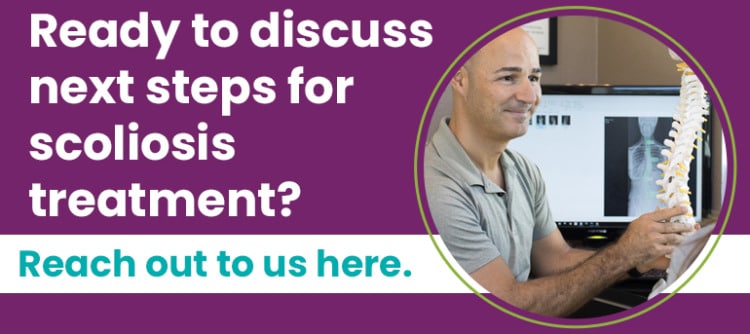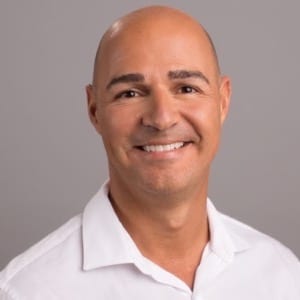Trinidad Scoliosis Treatment: Non-Surgical Solutions
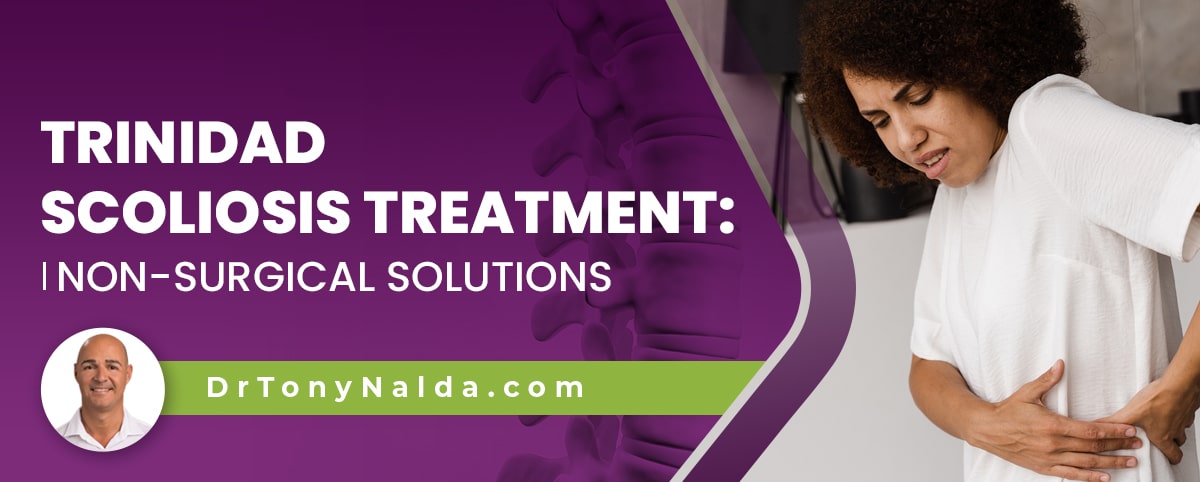
Nonsurgical scoliosis treatment has produced impressive results, proving that not all cases of scoliosis require surgical treatment. Scoliosis treatment will shape the spine's long-term spinal health and function, so choosing the type of treatment approach to commit to is an important decision.
For those in search of Trinidad scoliosis treatment, nonsurgical options provided by a leading conservative treatment provider are accessible with a 5-hour flight to Celebration, Florida's Scoliosis Reduction Center®.
Not everyone has the same level of access to medical treatment where they live; when the ingenuity of a treatment provider is renowned, patients can travel from throughout the country and world.
Table of Contents
What Does a Scoliosis Diagnosis Mean?
Current estimates have close to seven million people currently living with scoliosis in the United States alone.
While most of the Center's patients come from throughout the States, others have to travel further to access Dr. Tony Nalda's nonsurgical treatment approach.
One of the benefits of traveling to the Scoliosis Reduction Center® is that once there, Dr. Tony's integrative approach combines the power of multiple scoliosis-specific treatment disciplines, giving patients access to several different types of treatment under one roof.
So for those who have to travel to reach the Center, once here, there are many benefits, including the many attractions Orlando, Florida has to offer: Disney World, SeaWorld, and a variety of theme parks.
Being diagnosed with scoliosis means an unnatural sideways-bending and twisting spinal curve has developed, and as a progressive condition, scoliosis has it in its nature to get worse over time, and this means the size of the unnatural spinal curve is increasing, along with its effects.
The way progression is approached shapes a treatment response, so let's talk more about the condition's progressive nature.
Scoliosis Progression
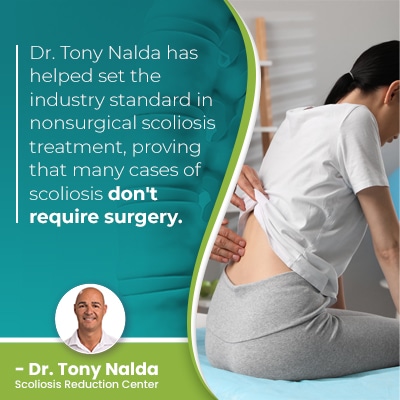 Scoliosis progression is triggered by growth, so for growing children, the risk of rapid and continued progression is high due to rapid and unpredictable growth spurts.
Scoliosis progression is triggered by growth, so for growing children, the risk of rapid and continued progression is high due to rapid and unpredictable growth spurts.
While scoliosis affects all ages, it's most commonly diagnosed during adolescence between the ages of 10 and 18, and adolescent idiopathic scoliosis is the most prevalent condition type.
A nonsurgical scoliosis treatment approach has the goal of working towards preventing progression, increasing condition effects, and the need for invasive surgical treatment in the future.
A traditional surgical response has the goal of stopping conditions from progressing, but this isn't the same as preventing them from doing so, so modern conservative treatment can be described as proactive, while traditional surgical treatment is reactive.
Because progression involves the scoliotic curve increasing in size, this makes it more complex to treat, hence the benefit of proactive treatment.
Progression makes the spine increasingly rigid and less responsive to treatment; increasing spinal rigidity also makes it difficult for some patients to perform key therapeutic exercises as part of treatment.
Progression isn't impossible, but can be difficult to reverse, and while there are never treatment guarantees, there are a number of benefits associated with early detection and intervention.
Conservative Treatment
Conservative scoliosis treatment offers a nonsurgical alternative that is safer and less invasive than traditional spinal fusion surgery.
Conservative treatment is integrative so combines multiple different scoliosis-specific treatment disciplines so conditions can be impacted on every level, and the complex nature of scoliosis necessitates the complete customization of effective treatment plans.
At the Center, located in Celebration, Florida, patients benefit from accessing different forms of treatment under one roof, and for those who have traveled from out of state to access the Center's treatment, Florida has a lot to offer in terms of tourist attractions.
Dr. Tony Nalda has helped set the industry standard in nonsurgical scoliosis treatment, proving that many cases of scoliosis don't require surgery.
Through the combination of chiropractic care, physical therapy and scoliosis exercises, corrective bracing, and rehabilitation, scoliosis can be highly treatable.
Chiropractic Care
Condition-specific chiropractic care is at the center of a conservative nonsurgical treatment approach because as a structural spinal condition, scoliosis needs to be primarily impacted on a structural level.
Chiropractic treatment includes a variety of techniques and manual adjustments that have the goal of adjusting the position of the curve's most-tilted vertebrae back into alignment with the rest of the spine, restoring as much of the spine's healthy curves as possible.
Physical Therapy
Physical therapy and scoliosis exercises can help prepare the spine and its surroundings for chiropractic treatment, and it's also a key facet of treatment that increases the strength of the spine's surrounding muscles so they can provide the spine with optimal support and stabilization.
Physical therapy can also address any related muscular imbalance, which scoliosis is associated with, by improving posture and brain-body communication by stimulating particular areas of the brain.
Scoliosis can cause a muscular imbalance by the unnatural spinal curve pulling its surrounding muscles in different directions, causing the muscles on one side of the spine to become weak from underuse, while muscles on the opposite side can become stretched and sore from overuse.
Corrective Bracing
Traditional scoliosis bracing is associated with a number of shortfalls that modern corrective bracing addresses.
The efficacy of traditional scoliosis braces, like the boston brace, is limited because they only address the condition as 2-dimensional, ignoring its rotational component, but scoliosis is a complex 3-dimensional condition that needs to be addressed as such.
Corrective bracing can be particularly effective on growing spines so is a regular facet of childhood scoliosis treatment and can help by pushing the spine into a corrective position and complementing other treatment disciplines.
Rehabilitation
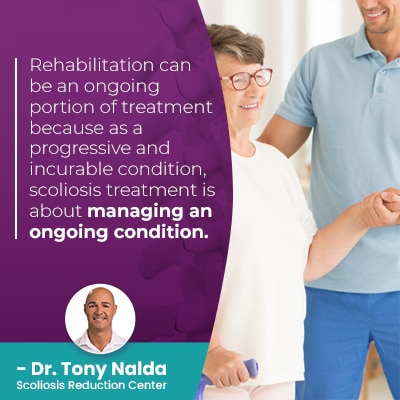 Rehabilitation can be an ongoing portion of treatment because as a progressive and incurable condition, scoliosis treatment is about managing an ongoing condition.
Rehabilitation can be an ongoing portion of treatment because as a progressive and incurable condition, scoliosis treatment is about managing an ongoing condition.
Scoliosis exercises and continued chiropractic care can help patients further stabilize and heal their spines from home.
So why travel from places like Trinidad and take a 5-hour flight to Celebration, Florida's Scoliosis Reduction Center®? Because the way a scoliosis diagnosis is responded to with treatment will shape the spine's long-term function, strength, and health.
Spinal Fusion Surgery
The other main treatment choice involves fusing the curve's most-tilted vertebrae into one solid bone so they can't become more unnaturally tilted over time (progress), but this is contrary to the spine's movement-based design.
Spinal fusion can straighten an unnaturally bent spine, but the way it does so by removing intervertebral discs between vertebral bodies to be fused, fusing bones together, and attaching metal rods to the spine to hold it in place is invasive and can cost the spine in a number of ways.
Many patients find the loss in spinal flexibility and range of motion to be disruptive to overall quality of life, and others find an increase in back pain, particularly around the fusion site, to be unpleasant.
Spinal fusion comes with the risks of infection, nerve damage, excessive blood loss, and an adverse reaction to hardware used, but the long-term effects of living with a fused spine are more concerning because once a spine is fused, it's fused for life.
If a fusion is unsuccessful, or hardware breaks, cracks, or comes loose years later, the only recourse is additional surgery, and risks of spinal surgery increase with each subsequent procedure and increasing age.
Potential risks, side effects, and complications of spinal fusion should be considered carefully; as a fused spine is weaker, it's also more vulnerable to injury.
Conclusion
Those in search of Trinidad scoliosis treatment need only a 5-hour flight to put them in contact with Dr. Tony Nalda of Celebration, Florida's nonsurgical treatment center.
People with scoliosis need treatment; as a progressive condition, scoliosis is unlikely to improve on its own, and management means treating it proactively.
Conservative nonsurgical scoliosis treatment options can lessen a patient's suffering by minimizing the condition's effects; treating the condition.s symptoms means addressing their underlying cause, the condition itself.
The effectiveness of scoliosis treatment will depend on a number of factors, and while there are never treatment guarantees, there are certain benefits associated with early diagnosis and intervention.
Scoliosis ranges in severity from mild scoliosis to moderate scoliosis, severe and very severe scoliosis, and the milder scoliosis is, the more treatable it's likely to be.
Scoliosis exercise can be part of leading a spine-friendly lifestyle and also treating the condition proactively.
When chiropractic care is combined with physical therapy, exercise, corrective bracing, and rehabilitation, progression can be prevented, along with increasing condition effects and the need for invasive surgical treatment in the future.
When it comes to improving the spine's alignment, this means restoring as much of the spine's healthy curves as possible; reducing the size of a scoliotic curve on a structural level so the condition's uneven forces, and their effects, can also be reduced and improved.
Regardless of condition type or severity, as a progressive spinal condition, the best time to start treatment is always now.
Dr. Tony Nalda
DOCTOR OF CHIROPRACTIC
After receiving an undergraduate degree in psychology and his Doctorate of Chiropractic from Life University, Dr. Nalda settled in Celebration, Florida and proceeded to build one of Central Florida’s most successful chiropractic clinics.
His experience with patients suffering from scoliosis, and the confusion and frustration they faced, led him to seek a specialty in scoliosis care. In 2006 he completed his Intensive Care Certification from CLEAR Institute, a leading scoliosis educational and certification center.
About Dr. Tony Nalda
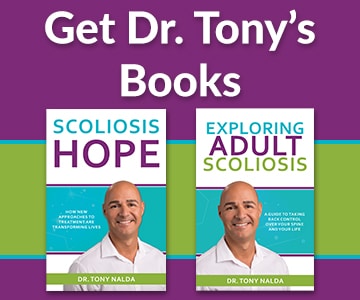 Ready to explore scoliosis treatment? Contact Us Now
Ready to explore scoliosis treatment? Contact Us Now